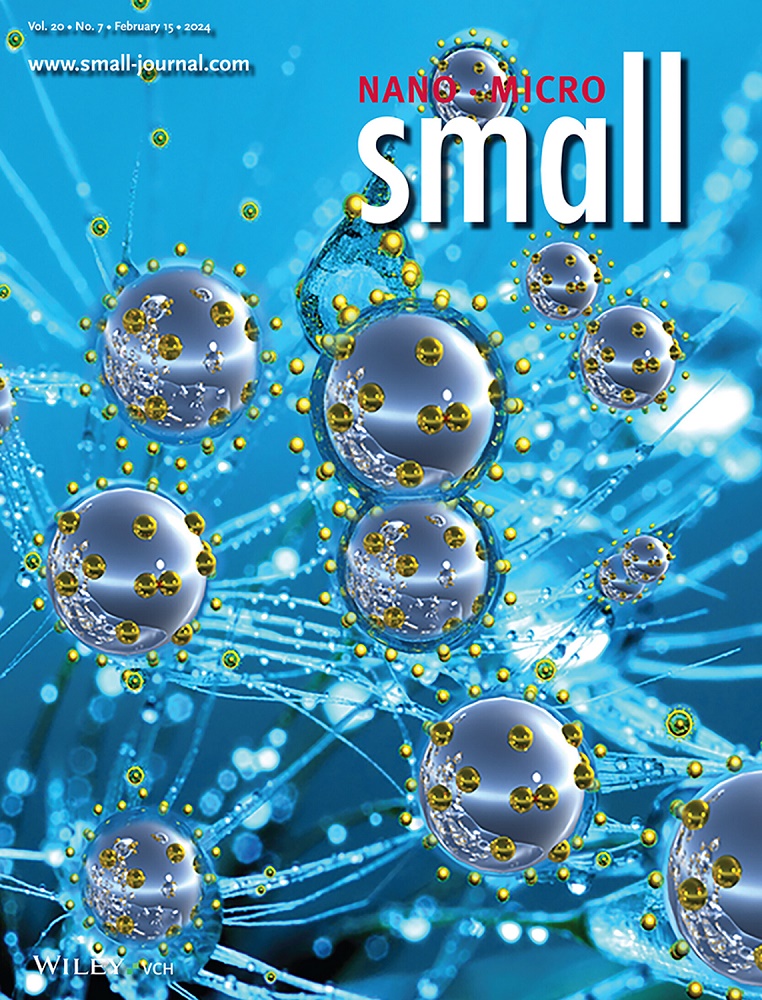在低金属离子含量下,离子和配位键协同增韧非中性聚两性聚合物水凝胶
IF 13
2区 材料科学
Q1 CHEMISTRY, MULTIDISCIPLINARY
引用次数: 0
摘要
聚两性聚合物(Polyampholyte, PA)水凝胶由于其独特的结构和优异的防污性能而受到人们的广泛关注。然而,超亲水性通常使非中性PA (n-PA)凝胶在水环境中高度膨胀,机械性能非常弱,严重限制了它们的应用。本文设计了金属配位键,通过二级平衡策略引入具有离子键的n-PA水凝胶的协同增韧。在设计中,将制备好的n-PA凝胶依次在金属离子溶液和去离子水中进行透析,得到韧性凝胶。通过这种策略,弱n-PA凝胶可以通过离子和金属配位键的协同作用显着增韧。系统的研究表明,极性单体的摩尔比和金属离子浓度对机械增强有明显的影响。通过选择不同的凝胶体系和多价金属离子,进一步证明了该策略的普遍性。值得注意的是,低金属离子浓度(≤0.1 m)的透析溶液可以实现协同增韧。采用理论模型揭示了增韧机理。这项工作不仅扩大了对强韧PA水凝胶制备的理解,而且为电解质溶液中的PA凝胶提供了一些见解。本文章由计算机程序翻译,如有差异,请以英文原文为准。

Synergistically Toughening Non-Neutral Polyampholyte Hydrogels by Ionic and Coordination Bonds at Low Metal-Ion Contents
Polyampholyte (PA) hydrogels, composed of charged hydrophilic networks with both positive and negative groups, have attracted great attention due to the unique structure and excellent antifouling properties. Yet, the superhydrophilicity usually makes non-neutral PA (n-PA) gels highly swollen and mechanically very weak in aqueous environments, severely limiting their applications. Herein metal-coordination bonds are designed to introduce to synergistically toughen n-PA hydrogels with ionic bonds via a secondary equilibrium strategy. In the design, as-prepared n-PA gels are dialyzed in metal-ion solutions and deionized water in sequence to achieve the tough gels. Through this strategy, the weak n-PA gels can be significantly toughened by the synergy of ionic and metal-coordination bonds. A systematic study indicates that both the molar ratio of oppositely charged monomers and the metal-ion concentration affect the mechanical enhancements clearly. The universality of the proposed strategy is further proved by selecting different gel systems and multivalent metal ions. Notably, low metal-ion concentrations (≤0.1 m) of dialysis solutions can enable synergistic toughening. Theoretical models are also adopted to disclose the toughening mechanism. This work not only expands the understanding on the fabrication of strong and tough PA hydrogels but also provides some insights for PA gels in electrolyte solutions.
求助全文
通过发布文献求助,成功后即可免费获取论文全文。
去求助
来源期刊

Small
工程技术-材料科学:综合
CiteScore
17.70
自引率
3.80%
发文量
1830
审稿时长
2.1 months
期刊介绍:
Small serves as an exceptional platform for both experimental and theoretical studies in fundamental and applied interdisciplinary research at the nano- and microscale. The journal offers a compelling mix of peer-reviewed Research Articles, Reviews, Perspectives, and Comments.
With a remarkable 2022 Journal Impact Factor of 13.3 (Journal Citation Reports from Clarivate Analytics, 2023), Small remains among the top multidisciplinary journals, covering a wide range of topics at the interface of materials science, chemistry, physics, engineering, medicine, and biology.
Small's readership includes biochemists, biologists, biomedical scientists, chemists, engineers, information technologists, materials scientists, physicists, and theoreticians alike.
 求助内容:
求助内容: 应助结果提醒方式:
应助结果提醒方式:


